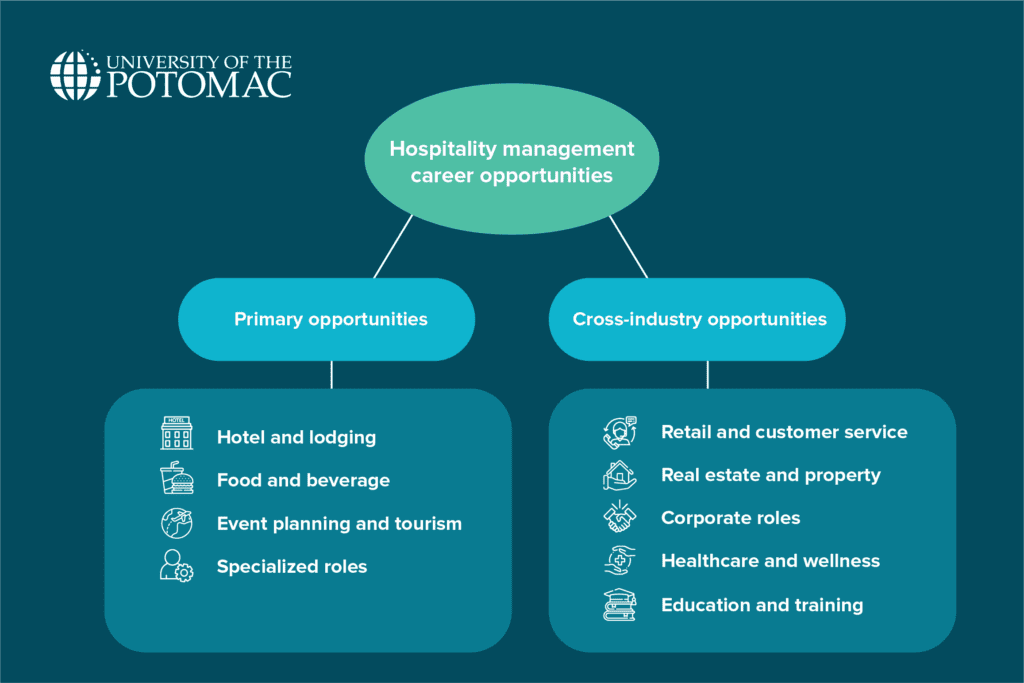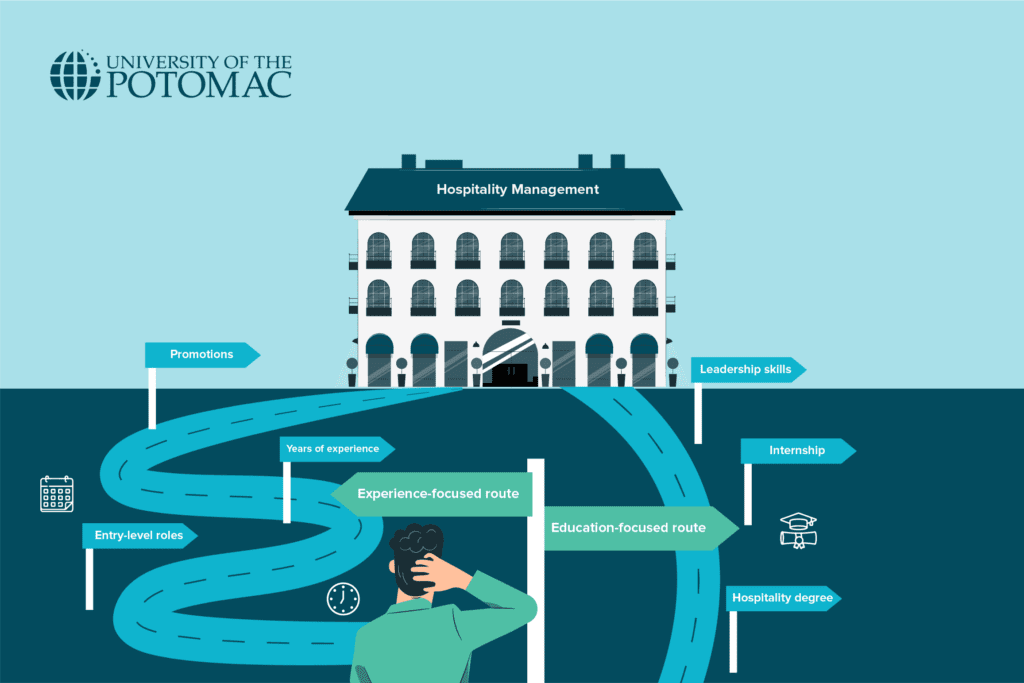Key Takeaways
- Hospitality management offers diverse career paths, from traditional management roles in hotels and restaurants to event planning and tourism, with opportunities extending into industries like real estate, healthcare, and education.
- The hospitality industry is growing rapidly, with market size projections rising from $4.7 trillion in 2023 to $5.8 trillion by 2027.
- A degree in hospitality management equips professionals with versatile skills such as leadership, communication, and adaptability.
- Success in hospitality requires a blend of formal education, hands-on experience, and adaptability to trends like sustainability, technology, and personalized guest services.
We all know that home isn’t necessarily one’s house—it’s a feeling of comfort, warmth, and belonging. In its truest sense, it’s the welcome smile, the perfect meal, and the small details that make you feel cared for. Hospitality workers aim to recreate that feeling for their customers every day, working together to turn spaces into havens. From the friendly greeting at the door to the beautifully prepared room and thoughtfully crafted menu, it’s a team effort guided by the coordination of one key figure: the hospitality manager.
As customers, we appreciate the magic of hospitality management. But what if you were on the other side, helping to create that magic? Is hospitality management a good career? The short answer is yes; the long answer awaits you below.
Why Is Hospitality Management a Good Career for You?
Hospitality management is a career centered on leadership and creating exceptional guest experiences across various industries, typically ranging from hotels and restaurants to events and tourism. It involves managing operations and enhancing customer satisfaction.
But what makes it a good career option? Well, for starters, the hospitality industry is experiencing significant growth. Therefore, it remains a promising field for career stability and opportunities.
According to the Hospitality Global Market Report, the industry grew from $4,390.59 billion in 2022 to $4,699.57 billion in 2023. This represents a compound annual growth rate (CAGR) of 7.0%, proof of the sector’s resilience and ability to recover from challenges, the most recent one being the COVID-19 pandemic.
The global hospitality market is actually projected to continue growing and reach a staggering $5,816.66 billion by 2027, with a slightly lower but still satisfactory CAGR of 5.5%.
The field also offers great flexibility when it comes to career options in hospitality and other industries.
Hospitality Management Career Opportunities

With an estimated number of 187,000 hotels worldwide (a rough estimate as the exact number is unknown), plus other facilities related to leisure, you can find so many work opportunities in diverse environments that suit your lifestyle. Some of the primary hospitality management career opportunities include:
Hotel and lodging
Working in hotel and lodging management means overseeing all the general operations of hotels, resorts, or whichever kind of accommodation you work in. The main responsibilities of this role are supervising staff, managing budgets, ensuring guest satisfaction, and maintaining facilities.
A hospitality management degree equips graduates with leadership skills, operational knowledge, and an understanding of guest expectations. Therefore, it makes them well-suited for such roles.
Food and beverage management
The managers working in restaurants, cafes, catering companies, and similar establishments focus on monitoring inventory, overseeing staff, planning menus, managing costs, and guaranteeing health and safety compliance.
The ability to remain organized and maintain quality standards is essential, especially in high-pressure environments like event catering or dining establishments. Therefore, a hospitality management background is invaluable, as you would be trained to deal with the intricacies of service delivery and create exceptional guest interactions.
Event planning and tourism
Event planners and tourism managers, true to their name, coordinate events and trips, from corporate conferences to destination tours. Their duties range from budgeting and logistics to client relations and marketing.
A hospitality degree provides insight into customer behavior, organizational skills, and the creative execution of events and tours necessary for success in this role. Creativity, precision, and the ability to multitask are also an absolute necessity.
Specialized roles
Other specialized roles in the hospitality industry include luxury concierge services, cruise management, and theme park operations. Hospitality management education provides the knowledge and adaptability skills needed to excel in any niche area, emphasizing attention to detail and a thorough understanding of the guests’ needs.
Career Opportunities in Other Industries
The skills you gain in hospitality management are highly transferable. Therefore, graduates aren’t limited to traditional roles in industries like hotels or tourism—their skills are highly valued across many other sectors, such as:
Retail and customer service
Professionals in retail management and customer service, similar to most management roles in hospitality, focus on the customers and providing them with satisfactory experiences. They handle various tasks, including, but not limited to, staff management, inventory oversight, and problem-solving, to create a welcoming atmosphere and build customer loyalty.
Skills in communication, conflict resolution, and guest relations—hallmarks of hospitality training—are directly applicable in this field as well.
Real estate and property management
In real estate and property management, professionals mainly have to deal with tenant relations and leasing. They also work on maintaining the property and even enhancing its appeal.
Hospitality management graduates bring a service-oriented approach and operational expertise to this role, helping them fulfill many of their daily responsibilities.
Corporate roles
Many corporate positions, such as customer experience managers or corporate event planners, also benefit from hospitality management skills. Since these roles involve work revolving around client relations and service processes, then hospitality expertise in coordinating logistics, managing budgets, and creating impactful experiences is particularly valuable.
Healthcare and wellness
Healthcare facilities and wellness centers are also increasingly prioritizing guest-centric services. For example, hospital administrators might oversee front-desk teams to confirm efficient check-ins, while spa managers focus on delivering relaxing and rejuvenating services.
Such roles require a mix of organizational skills and empathy that hospitality training provides. In both cases, the goal is to create environments where individuals feel cared for and valued, pointing to the relevance of hospitality skills even in such non-traditional settings.
Education and training
There is also always the possibility of taking on roles in training and teaching others. The hands-on expertise and knowledge of best practices gained through a formal degree make graduates ideal mentors and educators for people interested in this field of work.
Skills to Succeed in Hospitality Management
Success in hospitality management careers requires a set of skills that combine technical expertise with interpersonal abilities and problem-solving capabilities. Some of these skills include:
- Leadership
- Communication
- Problem-solving
- Time management
- Customer service
- Attention to detail
- Adaptability
- Multitasking
- Teamwork
- Financial management
- Conflict resolution
- Cultural awareness
- Negotiation
- Organizational skills
Challenges of a Career in Hospitality Management
As with all good things in life, careers in hospitality management aren’t without some potential challenges, too. The most common obstacles professionals face, which may lead to them second-guessing a career in this field, include:
High stress and long hours
The demanding nature of hospitality work often involves long shifts, unpredictable schedules, and constant pressure to meet guests’ expectations.
Over time, this can become too much and lead to burnout as well as decreased job satisfaction. However, it’s preventable if employers implement better time management strategies.
Staff turnover
With one of the highest turnover rates across all industries, the hospitality sector often struggles to retain employees.
Retention can be improved through employee training programs and mentorship opportunities. Additionally, offering competitive wages and recognizing employee contributions can also help create a sense of loyalty and belonging.
Customer complaints
Guest satisfaction is central to hospitality, yet complaints are inevitable and, if mishandled, can seriously harm a business’s reputation.
Interested in pursuing a degree?
Fill out the form and get all admission information you need regarding your chosen program.
This will only take a moment.
Message Received!
Thank you for reaching out to us. We will review your message and get right back to you within 24 hours.
If there is an urgent matter and you need to speak to someone immediately you can call at the following phone number:
- We value your privacy.
To best manage complaints, staff should receive conflict resolution training and be empowered to handle issues with empathy and professionalism.
Cultural and language barriers
Hospitality professionals may have to interact with guests and staff from all over the world, leading to potential miscommunications or misunderstandings due to cultural or language differences.
Promoting cultural sensitivity training, hiring multilingual staff, and training current staff to utilize translation apps and tools can help fill these gaps.
Technology integration
Adopting new technologies as needed is a definite necessity, but it can pose challenges for both employees and customers when they are unfamiliar with the new systems. However, gradual adoption of new technologies, along with ongoing support, helps both employees and guests feel more comfortable with the changes.
Future Trends in Hospitality Management
According to hospitality statistics, this industry is growing and developing at a great pace, with many new trends emerging in recent years. Technology has taken center stage, with 81% of hoteliers believing it will be critical to the success of hotel businesses over the next five years and 99% anticipating that their peers will adopt more tech solutions in this timeframe.
During the pandemic, over 81.7% of hoteliers implemented at least one new technology, with many focusing on tools that enable contactless experiences. Mobile keys, self-check-in kiosks, and integrated payment systems are just a few of the many examples of innovations that help professionals in hospitality enhance operations and guest satisfaction.
Sustainability is also becoming a non-negotiable priority in hospitality management. Guests increasingly seek eco-friendly accommodations that reflect their environmental values. As 81% of travelers desire to stay in sustainable accommodations, hotels are now adopting eco-friendly initiatives as green certifications and energy-efficient technologies are becoming standard features.
Data-driven personalization is another transformative trend. By utilizing big data, properties can anticipate guest preferences, tailor services, and deliver customized experiences that foster loyalty. Advanced analytics allow hotels to recognize returning guests, recommend services, and even optimize room settings based on individual preferences.
Travelers also prioritize health and well-being during their stays. So, hotels are responding by offering amenities like on-site yoga classes, wellness retreats, air purification systems, and healthy dining options. These offerings cater to a growing demand for holistic travel experiences that promote relaxation and rejuvenation.
As the hospitality industry continues to adapt to these trends and others, hoteliers who embrace innovation and align their strategies with changing guest expectations will have a better chance for long-term success.
Education and Qualifications

There are a few ways you can go about becoming a hospitality manager. If you want to focus on experience, then at a minimum, a high school diploma is necessary for entry-level roles. This allows you to gain practical experience and develop foundational skills that can lead to promotions to leadership roles.
Many professionals choose to start in such a way—through entry-level positions and working their way up. However, this requires a much longer trajectory compared to those with formal qualifications.
For faster career progression, an associate or bachelor’s degree in hospitality management is highly beneficial. These programs provide knowledge in customer service, operations, and leadership, often paired with internships to offer hands-on training.
For those aiming for senior positions, advanced qualifications like a master’s degree or relevant certifications can be a big help. These credentials help demonstrate expertise to employers but also, on a personal level, will help prepare you for the high level of responsibilities you’ll have in leadership roles.
The Bottom Line
Without a skilled hospitality manager, it can all quickly become chaotic: guests are left waiting for their rooms, meals are served cold, events are derailed by poor planning, and the overall sense of warmth and welcome is replaced by frustration. These are the very situations a hospitality manager prevents.
If you want to be the one who keeps things running, Potomac’s Bachelor of Science in Hospitality and Tourism Management program is the perfect way to start. Or you can take it one step further with the BS/MS program and truly master the art of making people feel at home.
After all, the difference between good and great is often the person leading the team.
Frequently Asked Questions (FAQs)
What is the highest-paying job in hospitality?
When it comes to salaries in hospitality management, one of the highest-paying jobs is that of Hotel Manager, with salaries that can exceed $100,000 annually, depending on the property and location.
Is hospitality management in high demand?
Yes, hospitality management is in high demand, with the Bureau of Labor Statistics projecting 1.9 million new jobs in leisure and hospitality from 2021 to 2031, accounting for 23.1% of all new U.S. jobs during this period.
How many years is a hospitality management degree?
A hospitality management degree typically takes four years to complete for a bachelor’s program, though associate degrees can be completed in two years.










